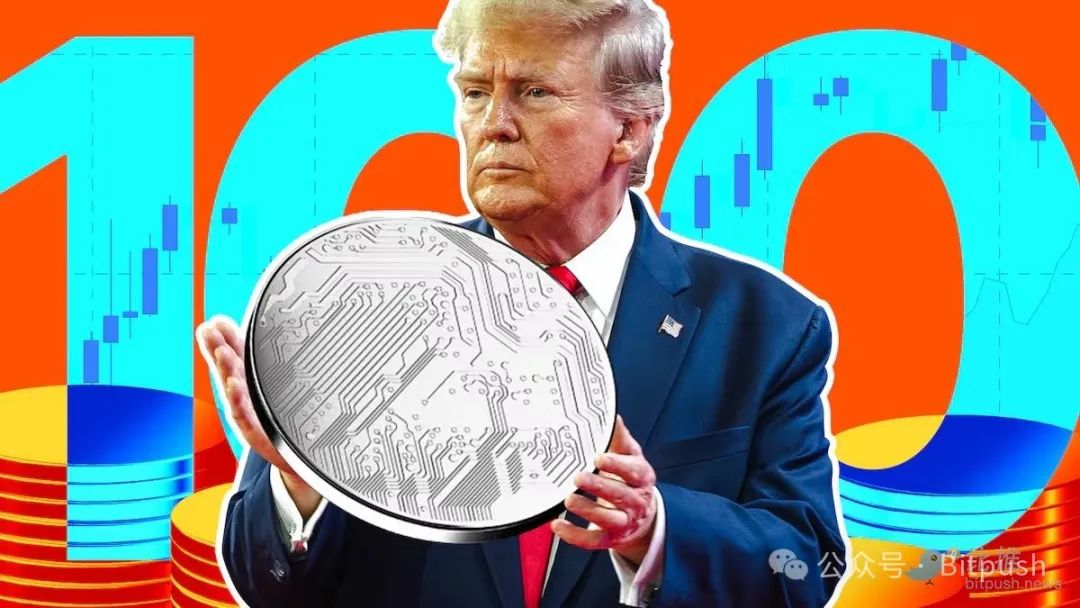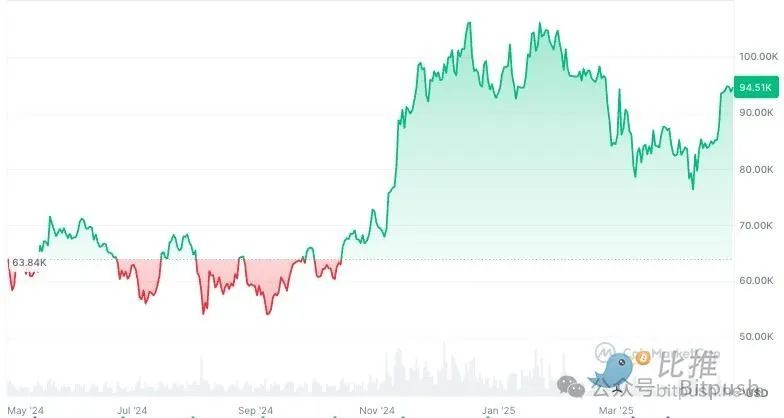
Since #Trump took office as US President, it has been a mess for all industries. As he celebrates the 100th day of his second term, supporters of digital assets are beginning to examine what Trump's administration has brought to the industry.
Mateusz Kara, CEO of cryptocurrency firm Ari10, told DL News that the question is "Do we overestimate what Trump can do?"
In last year's U.S. election, the cryptocurrency industry supported Trump, hoping that he would end the Biden administration's cryptocurrency crackdown, implement rules that would benefit the industry and start a bull run.
While some rules have been relaxed, the White House’s trade war has caused the global cryptocurrency market to lose nearly 21%, or about $800 billion, in value since its December high.
#Bitcoin is down more than 10% from its level on January 20, the day before Trump's inauguration, when the price of Bitcoin hit an all-time high of $109,225.
Earlier this month, Bitcoin was hit along with other risk assets by #tariff concerns, falling to below $74,500 on April 7 before rebounding to around $94,500 as of this writing, according to Dow Jones Market Data.

So, which promises has Trump delivered on so far, and where does that leave the industry?
The “Cryptocurrency War” in the Biden Era
Former U.S. President Joe Biden, a harsh critic of cryptocurrencies, pushed for strict regulation of the industry and supported a crypto crackdown initiated by then-Securities and Exchange Commission (SEC) Chairman Gary Gensler.
During the campaign, Trump promised to end Biden's "war on cryptocurrency."
After taking office, Trump replaced Gensler with a new pro-crypto chairman, Paul Atkins, who promised to bring clarity to cryptocurrency regulation.
This year, the SEC dropped lawsuits against cryptocurrency companies Coinbase, Ripple and Kraken, among others.
Trump has also appointed industry stalwarts such as Howard Lutnick, a financial mogul who backed Tether, as commerce secretary and David Sacks as cryptocurrency czar.
In his first 100 days in office, Trump issued a series of sweeping orders banning the creation of a digital dollar, protecting self-custody, establishing an advisory group to regulate cryptocurrencies, and establishing a strategic Bitcoin reserve.
He also pardoned Silk Road founder Ross Ulbricht and hosted the first White House cryptocurrency summit.
This year, federal regulators rescinded several Biden-era cryptocurrency guidelines, paving the way for financial institutions to move into cryptocurrency services.
Symbolic meaning > actual benefits?
In short, Trump appears to have delivered on most of his cryptocurrency promises. So why are some market observers unhappy?
“So far, many of the campaign promises seem to be more symbolic than substantive,” Jonathan Dixon, an executive at regtech firm eflow Global, told DL News.
“The Bitcoin Reserve is essentially a rebranding — these assets have long been held by the government and are not a sign of active market activity.”
Dixon said that while Trump’s move marked a “rhetorical shift from the previous administration,” “rhetoric alone does not translate into regulatory certainty.”
The Trump administration has yet to push for new laws to be passed, but some are advancing on Capitol Hill.
“We’re well on our way,” Sen. Tim Scott, R-South Carolina, said in early April.
Eric Rose, executive director of digital assets at StoneX Digital, noted: “These are all very positive factors for the field, but they take time to prove themselves… Just because banks are allowed to participate in the digital asset field, it doesn’t mean they can enter tomorrow, right? They need time to develop a strategy, decide the direction they want to develop, how to implement the strategy, and recruit relevant personnel for it.”
Eric Rose told Market Watch that this could take up to two years to prepare.
The chaos caused by the trade war
“The market may be disappointed with Trump’s administration because we don’t see the market rallying,” said Mateusz Kara, CEO of Ari10. “This is a result of the delay in cutting interest rates and the chaos Trump has brought to the market.”
Trump has so far failed to deliver on his promise to cut interest rates, which the Fed's move is seen as a catalyst for risk assets such as cryptocurrencies and stocks.
This is one reason why Bitcoin surged when the central bank cut interest rates in September and November.
The problem is that the Fed operates independently of the White House, and Fed Chairman Jerome Powell is reluctant to cut rates, especially after Trump imposed sweeping tariffs on nearly 100 countries (including an island nation where most of the inhabitants are "penguins") and made America's financial future even more uncertain.
The overall cryptocurrency market recovered slightly after Trump halted these tariffs, but any hostile action could offset that.
Anthony Young, chief commercial officer at cryptocurrency risk management firm CoinCover, said: “The U.S. government’s trade war will inevitably affect the cryptocurrency industry, and the focus will be on whether cryptocurrencies can continue to serve as a hedge against global market behavior.”
Some believe that Trump’s trade war could be good for cryptocurrencies.
“Trump’s foreign trade policies may actually make cryptocurrencies more attractive to those who want to avoid the traditional financial system or government control of currencies,” said Papuna Lezhava, CEO and co-founder of fintech startup Keepz and a former adviser to the International Monetary Fund.
This article is compiled from DL News, MarketWatch, etc. The views are for reference only















